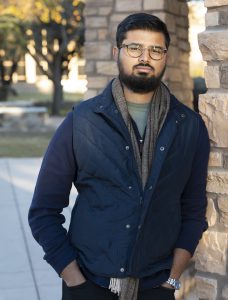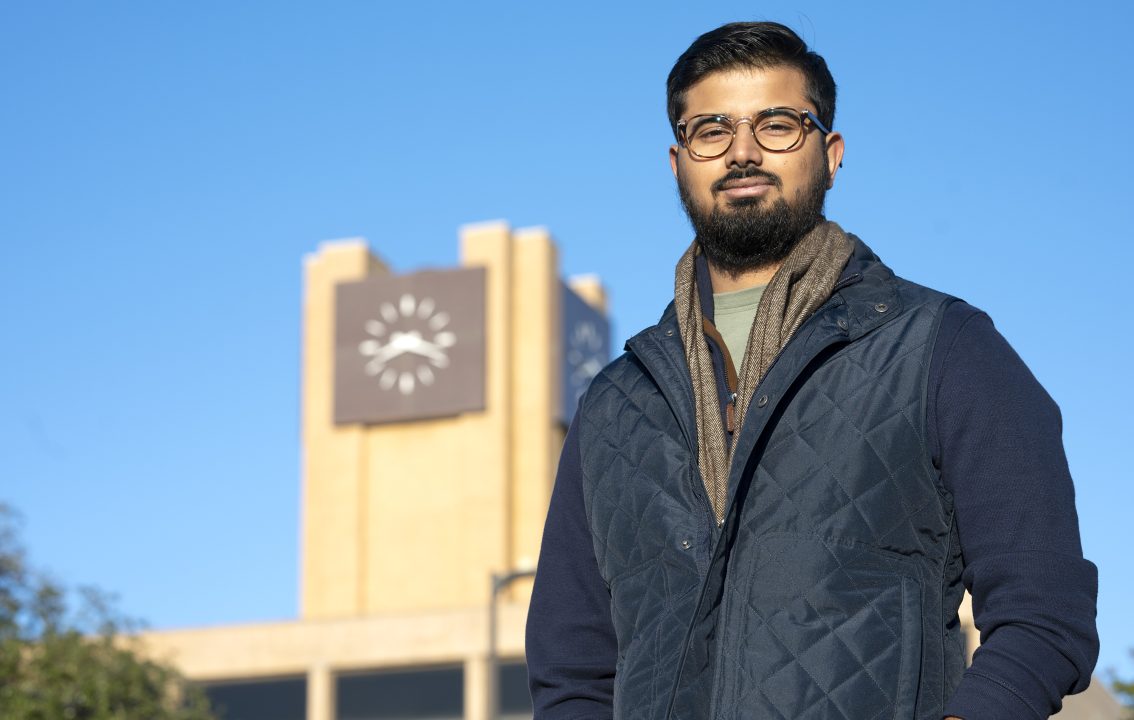The future is limitless for this graduate and scholarship winner who is already impacting public health
Manav Lamichhane owes his achievements at an Ivy League university to a few things: his intelligence, leadership, perseverance—and a flier posted at Tarrant County College.
Lamichhane, now 25, was a TCC student when the flier caught his eye in fall 2016. It announced that year’s prestigious Jack Kent Cooke Undergraduate Transfer Scholarship. The scholarship—awarded to elite U.S. community college students who plan to complete their bachelor’s degrees—would provide up to $55,000 a year for the cost of a four-year school. Nearing the end of his associate degree studies, Lamichhane decided to apply.
The scholarship required an extensive application, and Lamichhane gathered all the required documentation. He didn’t think much of it, though. “Absolutely no, I didn’t think I had a shot,” he reflects. “At TCC, I applied to things and took every opportunity that came along. With the Cooke Scholarship, I thought there was no way I would get it. Thousands of students apply nationwide.”
But among those thousands of applicants, Lamichhane stood out. Perhaps it was his 4.0 GPA as he worked toward his Associate of Science in chemistry and his Cornerstone Honors degree.
It could have been the many ways Lamichhane demonstrated servant leadership at TCC, and how he represented the College at a global seminar. The scholarship committee might have recognized his determination to succeed after coming to the United States at age 17 from his native Nepal, or his desire to positively affect public health here and abroad. “I really don’t know what it was,” says Lamichhane of what ultimately made him a Cooke Scholar. “But finding out that I got the scholarship was the best feeling ever.”
Those around Lamichhane at TCC had no doubt that he would be a worthy recipient of the scholarship. “Manav dedicated so much time and energy to both his academic excellence and his volunteerism,” says Cheryl North, instructor of sociology at TCC Northeast, where Lamichhane studied. North got to know Lamichhane as she organized the establishment of a food pantry on campus. Lamichhane played a key role, developing procedures, recruiting and managing student volunteers, overseeing an awareness campaign, collecting donations and staffing the pantry himself. “I cannot stress enough just how vital Manav’s work has been to the success of the pantry,” North shares, adding that it has served thousands of students in need annually and has since expanded to other campuses.
 Fighting hunger was personally important to Lamichhane. With the goal of going to medical school or working in health policy, he was keenly aware of the importance of nutrition to overall well-being. “I liked the impact of [the food pantry], seeing people coming in day to day,” Lamichhane recalls, noting that as a recent immigrant, he had not even realized that food insecurity was an issue here.
Fighting hunger was personally important to Lamichhane. With the goal of going to medical school or working in health policy, he was keenly aware of the importance of nutrition to overall well-being. “I liked the impact of [the food pantry], seeing people coming in day to day,” Lamichhane recalls, noting that as a recent immigrant, he had not even realized that food insecurity was an issue here.
“I came to the United States and thought, ‘No way students are struggling for food. That doesn’t happen.’ Clearly, I was wrong. And I wanted to dedicate time to that,” he explains.
In addition to working with the food pantry, Lamichhane decided to take food access efforts to another level. He proposed the creation of an on-campus community garden, in order to provide fresh produce to students served by the pantry. Lamichhane completed initial preparations, and the garden is now moving forward.
His commitment to improving the lives of others was evident in his other roles on campus as well. Lamichhane was vice president of student government and vice president of the Cornerstone Honors student group, and he participated in service projects as a member of Phi Theta Kappa Honor Society. He also was part of a cohort of students who represented TCC at the Salzburg Global Seminar in Austria. The summer program brings together the next generation of leaders to take on worldwide issues such as health care, hunger, education and economics. North (who served as a faculty leader on the trip) praises the insight, intelligence and diplomacy Lamichhane brought to the conference.
Over three years at TCC, he also made his mark with his studies. In addition to working toward his associate degrees, Lamichhane completed TCC’s emergency medical technician (EMT) training program, which he calls “one of the best experiences of my life.”
“From the first day, you just knew he was going places,” says Jodie Harbert, TCC’s senior clinical coordinator for emergency medical services. “He had read the text before he came to class and had notes to ask appropriate questions. He wanted more in-depth knowledge to increase his ability to take care of patients.”
Harbert was among the TCC instructors with whom Lamichhane formed a close relationship. He describes his professors’ guidance and the atmosphere they cultivated in the classroom as invaluable. “At the end of the day, that’s what you’re looking for—people to support you and say, ‘You can do this,’” Lamichhane reflects. “It’s harder to [form that bond] at a university. With the smaller class environment at TCC, we had a tight-knit group of students and one-on-one time with professors. You could go to their office anytime and they’ll help you. That aspect of TCC was the best.”
With his TCC studies finished, Lamichhane had his eyes on the Ivy League. Cornell University, a private research university in New York, appealed to him because of its Human Biology, Health and Society program, which offers students a foundation in human biology while examining health issues in the context of social science. With Lamichhane’s interest in both medicine and public health, it was a perfect fit. In addition to winning the Jack Kent Cooke Undergraduate Transfer Scholarship, he received a solid financial aid package from Cornell, making Lamichhane’s decision easy.
His core courses transferred, giving Lamichhane the opportunity to focus his studies on his exact areas of interest. He was determined to develop a strong rapport with both his professors and fellow students, just as he had at TCC. “I survived and thrived at Cornell,” Lamichhane says. “I’m sure TCC prepared me even in ways I never realized.”
He earned his bachelor’s degree from Cornell in 2019, completing his undergraduate education without any student debt. “I’m very lucky to be in that realm,” Lamichhane adds.
Upon graduation, Lamichhane went to work in Washington, D.C. as a public health policy analyst. When COVID-19 hit a year later, his job became remote, so Lamichhane returned to Fort Worth. His responsibilities shifted to support the federal government in implementing part of the CARES (Coronavirus Aid, Relief and Economic Security) Act to provide pandemic-related benefits to healthcare providers. He also assisted with the crisis by serving as an EMT volunteer at a county vaccination drive and working with friends to help older adults navigate the online sign-up process for vaccines. That willingness to serve comes as no surprise to North, who has remained in touch with Lamichhane. “Manav is exceedingly kind, and that kindness and care for others comes out in all that he does,” she says.
The future is wide open for Lamichhane. He enjoys his work in the health care policy arena and is considering pursuing his master’s degree to further this interest; he also has begun the process of applying to medical schools. In addition, Lamichhane wants to find ways to improve well-being in Nepal. During his time at Cornell, he had the opportunity to travel there and help build a shelter in a remote village, and he has thought about returning one day to establish clinics in other rural areas. Whatever he chooses for his path, Lamichhane’s TCC mentors will be watching closely. “I know he will leave a lasting legacy,” says Harbert. “He has already. I wish I had a classroom full of Manav Lamichhanes.”
For his part, Lamichhane wants other TCC students to know they can accomplish lofty goals, such as going to major universities on scholarship. “It’s absolutely possible,” he emphasizes. “I’m not the only one who has done it. Be willing to put in the time and effort and surround yourself with the right people. Build a relationship with your professors and seek their guidance. If you do, great things can happen.”

